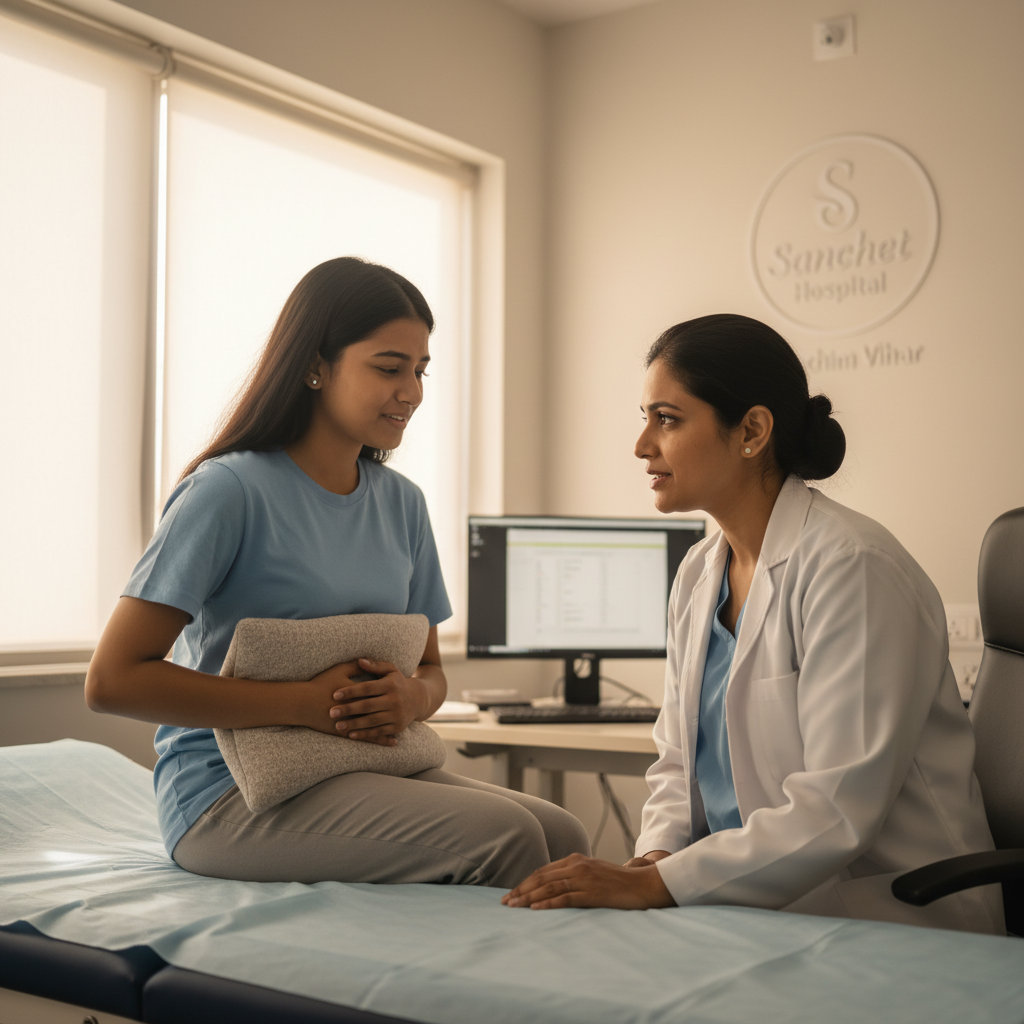Painful Periods: Causes, Relief & When to Seek Care | Sanchet Hospital Paschim Vihar
Many women experience painful periods, also called dysmenorrhea. This guide explains causes, safe home remedies, and when to seek help. We cover how we evaluate and treat painful periods at Sanchet Hospital in Paschim Vihar.
Understanding Painful Periods: Primary vs Secondary Dysmenorrhea and Common Causes
Painful periods (dysmenorrhea) fall into two main types: primary and secondary. Primary dysmenorrhea is menstrual pain without a visible pelvic problem. It often begins soon after menarche and may lessen with age. Risk factors include heavy flow, strong premenstrual symptoms, irregular cycles, and age under 30. (See AAFP overview: Diagnosis and Initial Management.)
Secondary dysmenorrhea arises from an identifiable condition. Common causes include:
- Endometriosis — uterine-like tissue outside the uterus causing severe cramping. (UNIVERSA MEDICINA)
- Uterine fibroids — benign growths that can cause heavy bleeding and pain. (Mountain West Medical Group)
- Adenomyosis — endometrial tissue within the uterine wall, linked to heavy periods. (AAFP)
- Pelvic inflammatory disease (PID) and hormonal disorders like PCOS. (UNIVERSA MEDICINA)
Knowing whether pain is primary or secondary guides management. If pain is progressively worse or starts later in life, make an appointment with our gynecology team at Sanchet Hospital (Gynecology Services).
Symptoms, Risk Factors and When Painful Periods Need Immediate Attention
Painful periods can present with a range of symptoms beyond cramps. Typical symptoms include lower abdominal pain, lower back pain, nausea, diarrhea, dizziness, and fatigue. Severe cases may disrupt school, work, or daily life.
Common risk factors for dysmenorrhea include:
- Early menarche (periods starting at a young age).
- Heavy menstrual bleeding and long periods.
- Smoking and a positive family history of painful periods. (AAFP)
- Age under 30 for primary dysmenorrhea.
Seek urgent care if you have any of the following:
- Sudden or severe pelvic pain that is different from your usual cramps.
- Very heavy bleeding soaking through a pad or tampon every hour.
- Fever or signs of infection, such as foul-smelling discharge.
- Symptoms that limit daily activities despite over-the-counter treatment.
If you meet these red-flag criteria, call us at Sanchet Hospital at 011-43106000 or visit during OPD hours. Our gynecology OPD runs Monday to Friday and Saturday mornings; see our FAQs for timings.
Home Care & Lifestyle Remedies: Pain Relief, Diet, Exercise and OTC Options
Most women find relief from painful periods with simple home measures and over-the-counter (OTC) treatments. Start with safe, evidence-based options and track which work best for you.
Effective home and lifestyle strategies include:
- Heat therapy — a hot water bottle or heating pad on the lower abdomen often eases cramps. Studies show heat can be as effective as NSAIDs. (PMC)
- Regular exercise — light aerobic activity and stretching increase circulation and release endorphins.
- Diet adjustments — a lower-fat or plant-forward diet may reduce pain intensity. (AAFP)
- TENS (Transcutaneous Electrical Nerve Stimulation) — can reduce pain by stimulating nerve fibers. (PMC)
- NSAIDs — ibuprofen or naproxen reduce prostaglandin-driven cramps. Take as directed and start at pain onset.
Practical tips:
- Start NSAIDs at the first sign of cramps for best effect.
- Keep a menstrual diary to track patterns and triggers.
- Stay hydrated and rest when needed.
If OTC measures fail or you need tailored advice, our gynecologists can review options and prescribe safe medical therapies. Book a consultation or a virtual visit with us.
Medical Evaluation at Sanchet Hospital: Tests, Imaging and Adolescent Care Pathways
At Sanchet Hospital, we take a structured approach to evaluating painful periods. The goal is to identify secondary causes and plan effective treatment. Evaluation typically includes:
- Detailed history and pelvic examination by our gynecologist.
- Blood tests — CBC, inflammatory markers, and hormonal panels via our Lal Path Labs partnership. (See lab services in FAQs.)
- Ultrasound imaging — a transabdominal or pelvic ultrasound helps detect fibroids, ovarian cysts, or adenomyosis. We offer multiple ultrasound types. (Service: Ultrasound Lower Abdomen / Whole Abdomen.)
For adolescents, we use a sensitive, family-centered pathway. We explain findings clearly and respect privacy. Early-onset severe pain often suggests primary dysmenorrhea, but we remain vigilant for endometriosis or structural issues. (Reference: AAFP dysmenorrhea guidance: link.)
If imaging or tests suggest a specific diagnosis, we discuss options such as hormonal treatment or laparoscopy. Our surgical team and OT are available for minimally invasive interventions when needed. You can contact us at 011-43106000 to schedule an evaluation.
Treatment Options and Multidisciplinary Care: Medications, IUDs, Laparoscopy and Ongoing Support
Treatment for painful periods at Sanchet Hospital is personalized. We combine medical, procedural, and supportive therapies to meet each patient’s needs. Common options include:
- Analgesics and NSAIDs for immediate relief.
- Hormonal therapy — combined oral contraceptives or progestin-only pills to reduce bleeding and cramps. (AAFP)
- Levonorgestrel-releasing IUDs — reduce bleeding and dysmenorrhea long-term.
- Laparoscopy — diagnostic and therapeutic surgery for endometriosis or adhesions. (AAFP endometriosis guidance)
- Multidisciplinary pain management — physiotherapy, pelvic floor therapy, counselling, and TENS when appropriate.
We coordinate care across specialties. Our gynecology clinic works with surgeons, physiotherapists, and counsellors. Surgical services and an operation theatre are available for necessary procedures. We also provide follow-up care to monitor response and adjust treatment.
To book a gynecology consultation or learn about our menopause and reproductive services, visit our gynecology page. You can call 011-43106000 to confirm clinic hours and doctor availability.
When to Arrange Care with Sanchet Hospital
Contact us if pain is new, worsening, or limits daily life. Our team is ready to evaluate, test, and create a care plan. Early diagnosis often preserves fertility and improves quality of life.
References:


